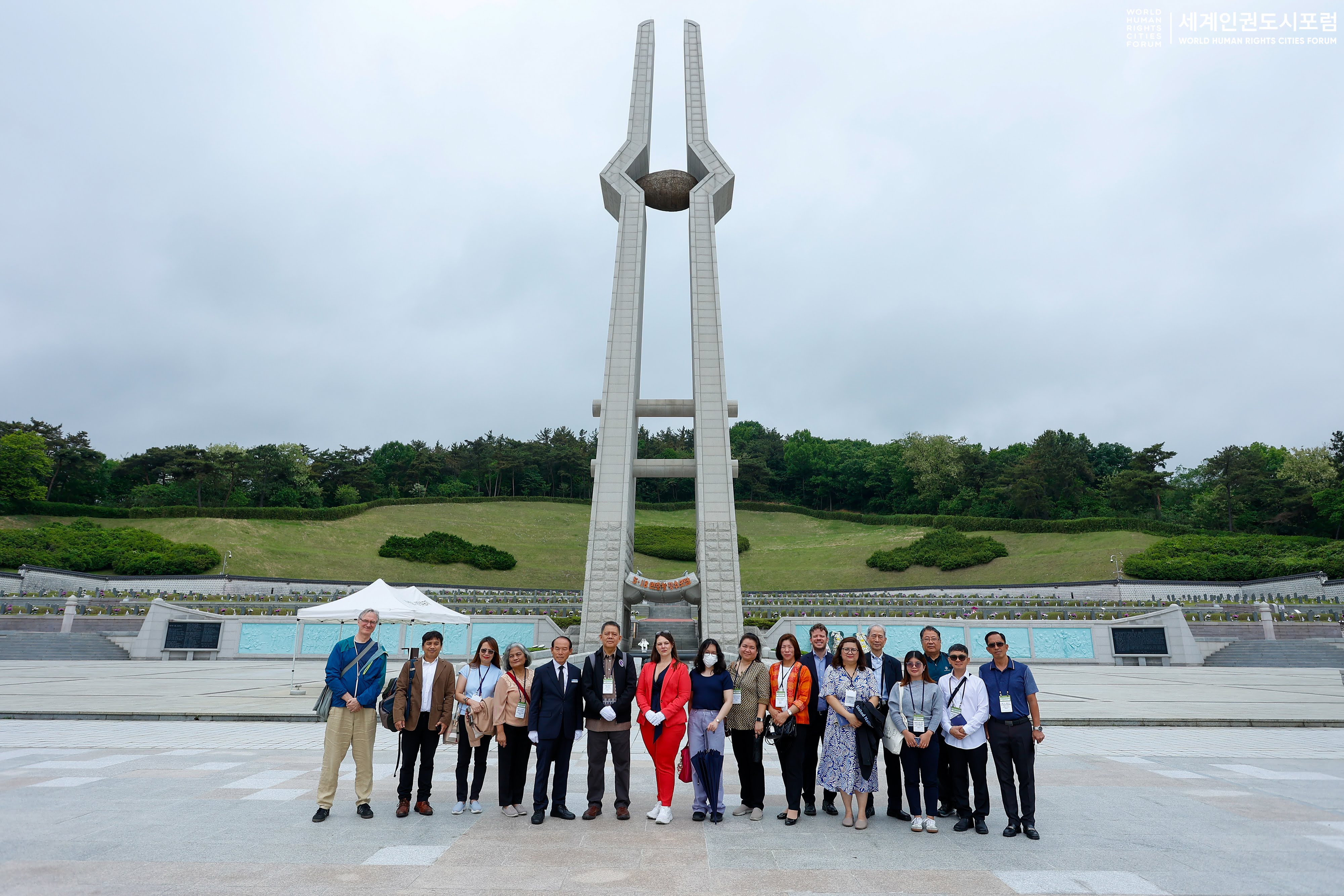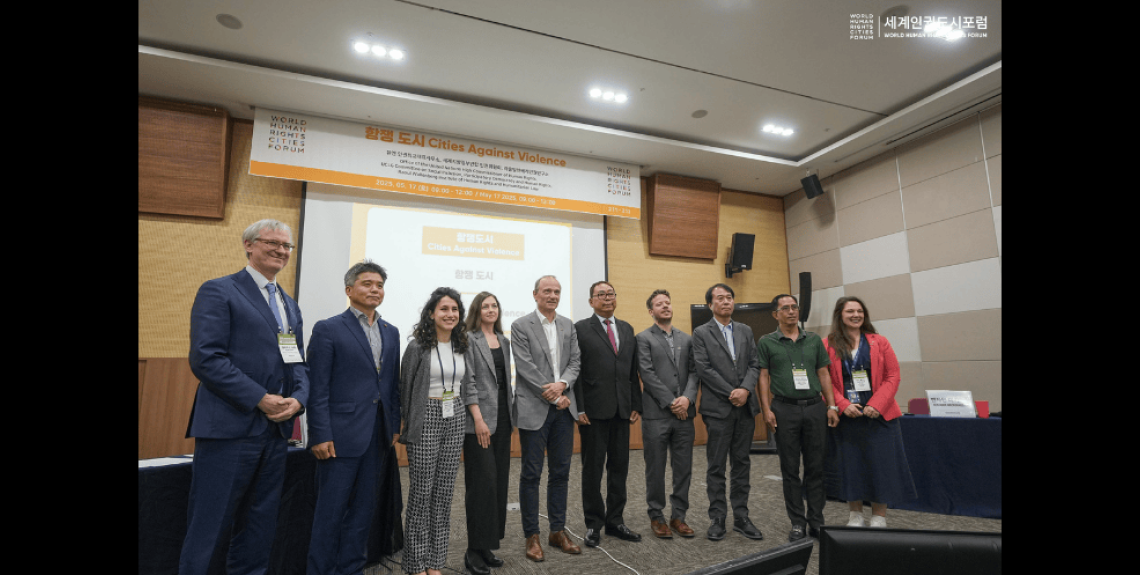From 16 to 18 May, the city of Gwangju hosted the new edition of the World Human Rights Cities Forum (WHRCF) under the theme “Peace and Solidarity: Human Rights Cities Acting for Conflict Prevention and Peacebuilding.” The forum reaffirmed the role of local and regional governments (LRGs) in advancing human rights, defending democratic values, and fostering social cohesion through memory, participation, and solidarity.
A Forum Rooted in Citizens’ Activism and Democratic Resilience
This year’s forum stood out not only for its rich content but also for its symbolic timing: it took place in Gwangju during the week of 18 May, Korea’s official day of remembrance of the Gwangju Uprising. The Secretariat of the WHRCF invited participants to join the local community in public acts of remembrance taking place in the Memorial Hall of the May 18th National Cemetery, turning memory into a shared, living experience.

The forum placed a strong emphasis on the legacy of citizen uprisings and civic activism as foundations for democracy and access to justice. The experience of Gwangju, whose 1980 uprising against martial law marked a turning point in Korea’s democratization, was a central focus—showcased as a symbol of democratic resilience and public courage.
Know more about the May 18 Democratic Uprising of Gwangju
The memory of these events remains vivid in the city’s public spaces and educational programs, reinforcing Gwangju’s identity as a human rights city. Jeju’s legacy was also reflected upon, especially regarding its 1948 uprising and the long journey toward justice and recognition.
Throughout the forum, participants explored the deep connections between democracy, human rights, and public trust, highlighting how historical memory fuels today’s democratic movements and inspires local efforts to protect rights and build just, inclusive societies.
Cities Against Violence: Exchanging Experiences of Local Uprisings
Together with the Office of the United Nations High Commissioner for Human Rights (OHCHR), the United Nations Educational, Scientific and Cultural Organization (UNESCO), and the Raoul Wallenberg Institute of Human Rights and Humanitarian Law (RWI), our Committee co-organized the session “Cities Against Violence”. Moderated by Benedetta Cosco, UCLG Policy Officer, the session brought together local experiences that approach violence from a rights-based perspective, rooted in memory, prevention, and democratic values.
Highlights from the session included:
-
Jenin (Palestine): Maysoun Dawood, Head of the Observatory on Violence against Women in Jenin, highlighted how the initiative supports women amid the ongoing violence in the territory, applying a strong gender and peacebuilding perspective. Cyril Benoit, Decentralized Cooperation Project Manager at the Seine-Saint-Denis Departmental Council, emphasized the vital role of international solidarity in supporting cities against violence.
-
City of Yangon (Myanmar): Aung Myo Min, Minister for Human Rights of the Myanmar National Unity Government, underscored the importance of youth and LGBTQI+ activism in resisting authoritarianism and preserving democratic aspirations. Creative forms of protest—such as the iconic umbrella demonstrations—were presented as expressions of both memory and resilience.
-
Jeju Province (Korea): Yang Seongju, Deputy Chair of the Jeju 4-3 Victims’ Families Association, reflected on the Jeju April 3 Uprising, its long path toward recognition and reparation, and its profound impact on access to justice and remembrance at the local level.
City of Graz (Austria): Klaus Starl, Director of the UNESCO Centre for Promotion of Human Rights at Local & Regional Levels and PhD from the University of Graz, showcased the preventive approach of Graz to violence through mediation, institutionalising human rights via local declarations and frameworks that inform public policy.
-
Baguio City (Philippines): Benjamin Macadangdang, Human Rights Focal Point of the City of Baguio, highlighted efforts to ensure reparation and justice for victims, grounded in a human rights framework.
-
City of Winnipeg (Canada): Sherri Rollins, Councillor and Chair of the Human Rights Committee of the Winnipeg City Council, explained that, as a host of the Canadian Museum for Human Rights, Winnipeg places a strong focus on the rights of Indigenous Peoples and migrants, addressing key issues such as housing, food, health, and the disproportionate violence against these groups. The city promotes reconciliation through dialogue, participation, and a decolonial approach to human rights, while highlighting the importance of public spaces to reclaim power.
-
UNESCO: Dorian Rommens, Programme Specialist at UNESCO, emphasized the central role of education and culture in promoting peace and inclusion at the local level through its cities’ networks. He also called attention to the growing impact of climate change on social cohesion and conflict, and the need to include these concerns in human rights city agendas.
Local Democracy as a Foundation for Peace
The discussions in Gwangju confirmed that local governments are not only implementers of rights but active defenders and innovators of democratic governance, even in the face of the current global challenges. Our Committee remains committed to supporting LRGs in their pursuit of peace, justice, and human rights, recognizing the transformative power of memory, education, and inclusive governance.
As we continue building a new social contract rooted in peace and peacebuilding, LRGs have a crucial role to play—connecting global values with local realities, and ensuring that no one is left behind.
Read the 2025 WHRCF Final Report
The WHRCF 2025 Final Report is now available. This publication offers a comprehensive summary of key discussions and outcomes from thematic sessions to special events—including our "Cities Against Violence" session (pp. 50-51).


